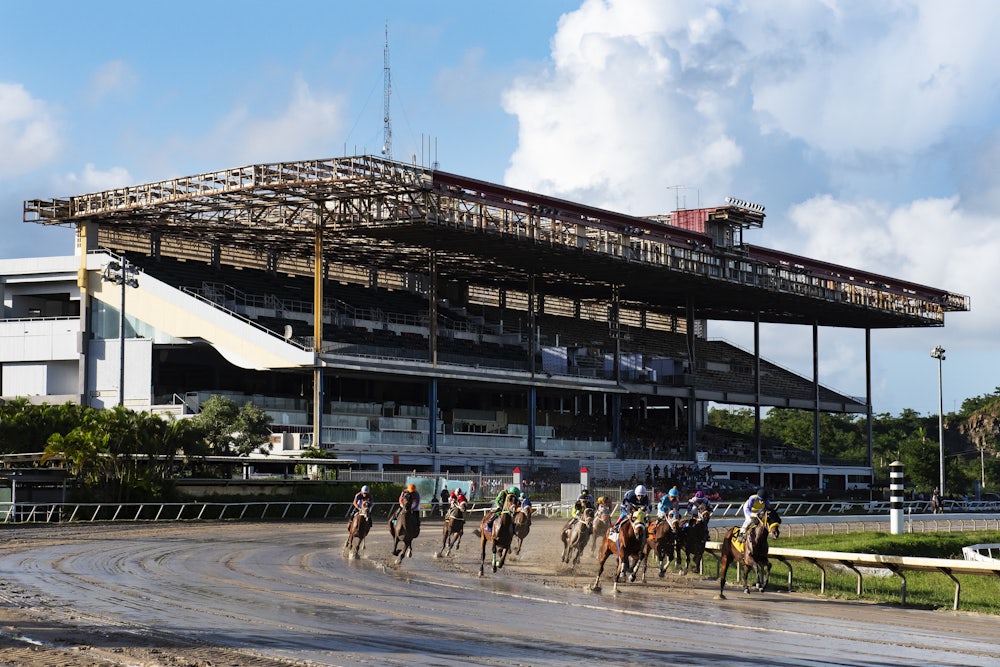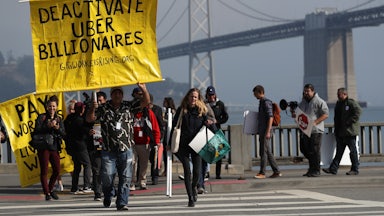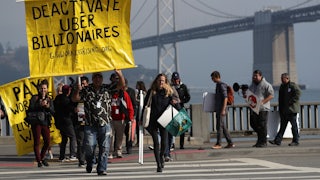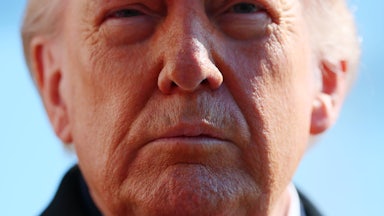Can Uber
drivers and other gig workers legally go on strike? Until very recently, the
answer was no, in the absence of special authorization by state law. Categorized
as independent contractors by gig corporations, these workers, generally
speaking, cannot collectively bargain or strike without violating antitrust
laws. The Department of Justice and the Federal Trade Commission said
as much in a 2017 brief.
For a long while, the government and corporate actors have used antitrust laws—which Congress originally enacted to rein in oligarchs such as John D. Rockefeller and J.P. Morgan and to disperse power downward to farmers, ranchers, workers, and local firms—to thwart the collective action of independent contractors and small firms. Last month, however, a federal court of appeals in Boston ruled that independent contractors can strike for higher wages, a decision that could transform labor relations in the gig economy.
It’s been a long and winding path to this point. On June 30, 2016, a group of 37 jockeys in Puerto Rico went on strike over low pay and mistreatment on the job. They had long complained to racehorse owners and the operator of the Camarero Racetrack about the terms and conditions of their work and demanded a pay increase and better treatment. They earned a standard “mount fee” of $20 for each ride, which was only about one-fifth of what jockeys in the continental United States received. The jockeys hoped the strike would compel racehorse owners, the racetrack owner, and Puerto Rico’s regulator of horse races to accept their demands. As a result of the strike, the track canceled races on June 30, July 1, and July 2, 2016.
The strike proved to be short-lived and unsuccessful. Instead of meeting the call for better working conditions, the track operator and racehorse owners hit the jockeys, their spouses or partners, and their union with an antitrust lawsuit to end the strike. The track owner and association of racehorse owners alleged the strike was an illegal restraint of trade under the Sherman Act, the federal antitrust law enacted in 1890. They aimed to end the strike, prevent future strike activity, and recover damages (automatically multiplied by three in antitrust suits) for the economic losses due to the cancellation of races.
A federal district judge in Puerto Rico, in a series of decisions, ruled in favor of the track operator and racehorse owners. On July 2, 2016, he ordered the jockeys back to work and subsequently prohibited them from engaging in strike action again. Further, the judge concluded that the operator of the Camarero Racetrack and horse owners sustained damages of more than $300,000 from the jockeys’ three-day strike and the resulting cancellation of races. Because of the trebling of damages in antitrust suits, the jockeys, their partners, and their unions were liable for nearly $1.2 million. The resolution of this battle was disturbingly ironic: The operator of the Camarero Racetrack—the only track in Puerto Rico and, as such, a monopoly on the island—and the association of racehorse owners successfully used the antitrust laws against poorly paid workers who had organized for better conditions at work.
For independent contractors and labor organizers, the outcome in the case was a familiar one. Federal antitrust authorities and the courts have treated organizing among electricians and ice skating coaches as no different from price-fixing among large businesses. They have deemed both to be illegal collusion. Workers who are classified as employees have an out: They are protected under antitrust law’s “labor exemption” and can form unions, bargain collectively, and strike. Independent contractors, however, cannot avail themselves of this exemption. The courts and antitrust enforcers treat them as mini-businesses and prohibit them from banding together to build power.
In the past few decades, the Federal Trade Commission has brought many cases against independent contractors for striking and collectively bargaining. In a 1990 decision called FTC v. Superior Court Trial Lawyers Association, the Supreme Court (in)famously held that public defenders in Washington, D.C., violated the antitrust laws when they went on strike for higher pay. And in 2017, the DOJ and the FTC publicly stated collective bargaining by Uber and Lyft drivers, who are misclassified as independent contractors, would violate the antitrust laws. Even though current FTC Chair Lina Khan has signaled her agency won’t use antitrust laws against worker organizing, the threat of private lawsuits remains real, as the jockeys learned the hard way.
The jockeys appealed the adverse decision to the Court of Appeals for the First Circuit, which hears appeals from federal district courts in Maine, Massachusetts, New Hampshire, Puerto Rico, and Rhode Island. In a major break with prevailing thinking, the First Circuit reversed the district court’s decision and ruled in favor of the jockeys. The court critically ruled that the jockeys are entitled to the labor exemption. The court reviewed two key laws on the relationship between labor organizing and the antitrust laws: the Clayton Act and the Norris-LaGuardia Act. The former declares that the “labor of a human being is not a commodity or an article of commerce,” while the latter restricts courts’ ability to enjoin labor actions. The court concluded that antitrust law’s labor exemption protects strikes when they arise “(1) out of the actions of a labor organization and undertaken (2) during a labor dispute, (3) unilaterally, and (4) out of the self-interest of the labor organization.”
Moreover, the court rejected the notion that independent contractors automatically commit an antitrust violation when they go on strike. Indeed, the judges held that the jockeys’ status as independent contractors is immaterial and noted that prior cases such as Superior Court Trial Lawyers Association had not directly addressed whether the labor exemption applies to independent contractors. Instead, it said the key question in deciding the applicability of the labor exemption is “whether what is at issue is compensation for [the workers’] labor.” The court drew boundaries around the labor exemption and stated, “Disputes about wages for labor fall within the exemption but those over prices for goods do not.” Under the court’s decision, independent contractors can strike over wages and other terms of work without breaking the antitrust laws.
The decision has major ramifications for gig workers and other independent contractors. Uber, Doordash, and other gig platforms have consistently (mis)classified their workers as independent contractors. They wield employment-like control over them by dictating their rates, routes, pickups, and wages but shed the duties and responsibilities of employment, such as paying minimum wages and overtime and providing benefits. Under this system of “control without responsibility,” these corporations get to have their cake and eat it too. For the drivers, it is the worst of both employment and independent contracting. They endure the standard control and indignities of working for a boss but without the rights and protections that come with employment, such as the freedom to form a union and to strike.
The First Circuit’s ruling creates space for organizing by gig workers. Under the court’s test for the labor exemption, independent contractors can strike for higher wages without violating the antitrust laws. This legalization of strike activity is a major step forward. Now Uber drivers, in one part of the country, can form unions, demand higher wages as a group, and collectively refuse to work. Until this decision, Doordash deliverers in Boston, Providence, and San Juan would run a serious risk of antitrust liability if they went on strike. Now they can proceed with some confidence that this action won’t violate the antitrust laws.
The limitations of the court’s decision should be acknowledged. The First Circuit covers four states and one territory with a combined population of around 14 million, and so its ruling affects only a small fraction of all workers in the country. Further, the court did not grant independent contractors an affirmative right to form unions and stage strikes with legal protection against their bosses’ retaliation, nor did the ruling confer the other rights that come with employment. For example, independent contractors in the First Circuit’s territory are still outside the confines of the National Labor Relations Act and not entitled to the federal or local minimum wage. More critically for gig workers and many other independent contractors, the court did not solve the misclassification problem.
In articulating the scope of the labor exemption, the court limited its availability by distinguishing bargaining over wages from bargaining over prices. This could be a doctrinal hook for union-busting antitrust lawyers who may argue that striking independent contractors are seeking to raise the price of goods and services, not their wages. And under the court’s distinction, millions of powerless actors in the economy still cannot organize. For example, Amazon sellers likely would commit an antitrust violation if they boycotted the online retail giant to pressure it to lower commissions and fees.
Notwithstanding these caveats, the court ruling is an important advance and a possible harbinger of more to come. Thousands of workers, whose collective action was presumed to be outlawed, can likely now form unions and strike over wages and other terms of work. Without the antitrust threat looming over them, they can join the labor militancy that has swept the country in other low-wage sectors with little union presence up until now. The First Circuit’s decision could also persuade other courts to follow suit and permit independent contractors to build power without violating the laws that Congress originally passed with the intention of controlling the autocrats of trade—but which for too long have been used as a legal brickbat against labor’s most unprotected class of workers.










